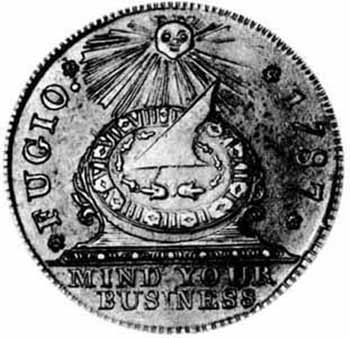Here's one penny that's worth many times more than it's weight in gold.
I think Ben Franklin must have had a wicked wit.

Benjamin Franklin designed the first coin of the United States of America. On one side he placed the word Fugio beside a sundial. Fugio in Latin means I Fly, and in conjunction with the sundial it implies "Time Flies." With the sun above the sundial, the effect of the design is rather artistic and coveys two of Franklin's favorite aphorisms, Time Flies, Mind Your Own Business --- Also Tempus Fugit.
Tempus fugit is a Latin expression meaning "time flees", more commonly translated as "time flies". It is frequently used as an inscription on clocks. The expression was first recorded in the verse Georgics written by Roman poet Virgil: Sed fugit interea fugit irreparabile tempus, which means, "But it flees in the meantime: irretrievable time flees".
The meaning is sometimes used less colloquially as: "Meanwhile, the irreplaceable time escapes", expressing concern that one's limited time is being consumed by something which may have little intrinsic substance or importance at that moment.
The expression is succinct and poignant, causing it to appear in numerous ways in modern culture. It appears as titles for television episodes (The X-Files or Stargate Atlantis), and musical compositions (jazz pianist Bud Powell, progressive rock group Yes). It also makes many appearances in literature, television (Star Trek: Voyager), and movies.
------
The Time Flies Cent
After the Thirteen Colonies won their independence from England, it quickly became apparent that they were only loosely united. Each state was very protective of it's liberty, and one privilege each coveted was the right to regulate money. Every state established it's own exchange standards for the coins then in circulation, the most important of which was America's First Silver Dollar.
The founding fathers knew the existing system was too cumbersome to facilitate trade between the states and the rest of the world. Two of the major questions they grappled with for the five years between 1782 and 1787 concerned who would have the right to regulate money, and just what form would that money take.
Before the Constitution was adopted, whether or not the thirteen colonies would be able to form a united country remained to be seen. One of the stumbling blocks was money (Library of Congress).
..snip..
There was a shortage of small coins at the time, and as a result, one coin being minted in some of the states was a large copper penny. The size, weight and dimensions of the coins being produced didn't vary much from mint to mint.
Even though the issue of the US Mint was still unresolved, in 1787 Congress purchased 300 tons of copper and contracted with a private mint in Connecticut to produce pennies. Those who had favored the Morris system agreed to the production of pennies, and since they were not establishing a Mint, they perhaps felt they were not adopting Jefferson's system. Those who favored decimal coinage may have felt that since 100 pennies equaled the decimal system dollar, the production of this coin would literally put the Jeffersonian system into the pockets of Americans in every state.
In order to avoid any more controversy, Congress turned to Benjamin Franklin, asking him to design a coin everyone could accept.

Franklin went right to work designing the first coin of the United States of America. On one side of the coin he placed the word Fugio beside a sundial. Fugio in Latin means I Fly, and in conjunction with the sundial it implies "Time Flies." Franklin also put one of his favorite mottoes, "Mind Your Business" on this side of the coin. With the sun above the sundial, the effect of the design is rather artistic and coveys two of Franklin's favorite aphorisms: Time Flies, so, Mind Your Business.
On the other side of the coin Franklin decided to put a message for everyone in the new nation. Around the outside he placed thirteen entwined rings, one for each of the the thirteen states. In the center of the coin the words United States appear surrounding the slogan "We are one."
Franklin's Fugio Cents were minted and immediately entered circulation.
Later in 1787 Congress approved the Constitution of the United States of America, and in 1788 the states ratified it, agreeing once and for all with Franklin's message: We Are One...cont'd
http://www.collectsource.com/time.htm